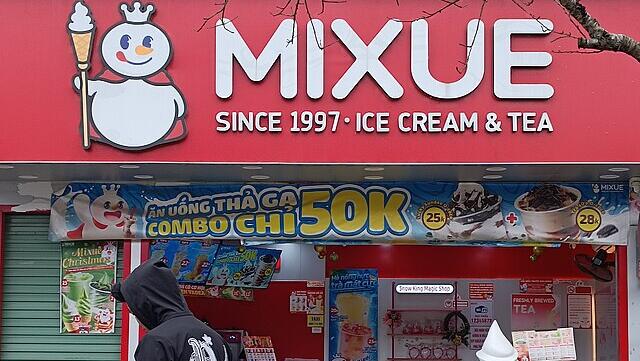The largest fresh-drinks company in China, Mixue Group, has launched an initial public offering (IPO) in Hong Kong to raise HK$3.45 billion (A$703.2 billion) on the grounds of its strong supply chain and low prices.
Shares in Mixue Group (HK:2097.HK) jumped nearly 30% on their first day of trading on the Hong Kong Stock Exchange today.
The drinks giant sold 17 million shares in the deal at a fixed price of HK$202.5 each with the shares staring trading at HK$262 each with the gains outpacing a 0.8% rise in Hong Kong's Hang Seng Index.
Other bubble tea chains from Mainland China debuted in Hong Kong in February including major competitor Guming.
However, competitor products are in the 10-20 yuan range, while Mixue has a 60% market share in the under-10-yuan segment, giving the company "absolute dominance", according to Richard Lin, chief consumer analyst at SPDB International.
According to the company's prospectus, products are priced at around 6 yuan (A$1.33) or less.
The low cost is a result of Mixue’s operating model which is supported by a "comprehensive end-to-end supply chain" including a procurement network in 38 countries worldwide, 5 large production facilities, logistics, research and development and quality control.
In the first 3 quarters of 2024 Mixue sold 7.1 billion drinks with profit surging 45.2% from a year earlier, with revenue rising 21.2% to 18.7 billion yuan.
Most of the company’s revenue is generated by selling equipment and ingredients such as milk, coffee and syrups to over 45,000 Mixue franchises.
"As market capacity can be uncertain in the [fresh-drinks] industry, the fact that Mixue can sell raw materials to its own franchisees and have a clear understanding of their demand gives it a lot of agency compared to others," Kenny Ng Lai-yin, a strategist at Everbright Securities International told South China Morning Post.
The company’s retail portion has already reportedly attracted more than HK$1.6 trillion (A$330.9 billion) in subscriptions on debut in Hong Kong, with retail investors said to have borrowed nearly HK$1.8 trillion from brokerages to subscribe.
Related content



